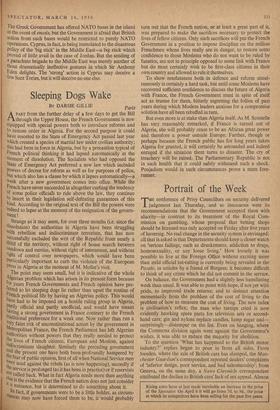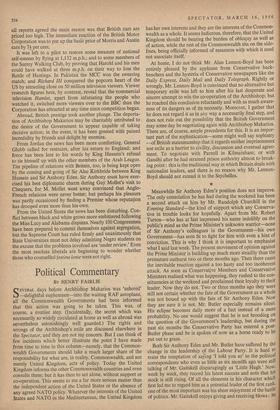Portrait of the Week
THE conference of Privy Councillors on security delivered 1 judgement last Thursday, and so innocuous were its recommendations that the Government accepted them with alacrity—in contrast to its treatment of the Royal Com- mission on gambling, whose proposal that betting shops should be licensed was only accepted on Friday after five years of havering. No real change in the security system is envisaged; all that is asked is that Departments should keep a closer watch on 'serious failings, such as drunkenness, addiction to drugs, homosexuality, or any loose living.' How loosely it was possible to live at the Foreign Office without exciting more than mild official tut-tutting is currently being revealed in the People, in articles by a friend of Burgess; it becomes difficult to think of any crime which he did not commit in the service. On balance, the Government had a slightly less humiliating week than usual. It was able to point with hope, if not yet with pride, to improved trade returns; and to distract attention momentarily from the problem of the cost of living to the problem of how to measure the cost of living. The new index is civilisation's reflex; the man who turnips cried is now evidently hawking spare parts for television sets or second- hand cars; gin and nylons replace candles, lump sugar and—, surprisingly—distemper on the list. Even on hanging, where the Commons division again went against the Government's wishes, it was able to reduce the majority for abolition.
To the question 'What has happened to the British motor industry?' replies began to pour in from all sides. From Sweden, where the sale of British cars has slumped, the Man- chester Guardian's correspondent reported dealers' complaints of 'inferior design, poor service, and bad salesmanship'; from Geneva, on the same day, a News Chronicle correspondent attributed the decline to British cars' lack of sex appeal. Almost all reports agreed the main reason was that British cars are priced too high. The immediate reaction of the British Motor Corporation was to put up the basic price of Morris and Austin cars by 71 per cent.
It was left to a pilot to restore some measure of national self-esteem by flying at 1,132 m.p.h.; and to some members of the Surrey Walking Club, by proving that Harold and his men could have walked at three m.p.h. on their way to lose the Battle of Hastings. In Pakistan the MCC won the swearing match; and Richard 111 conquered the popcorn heart of the US by attracting close on 50 million television viewers. Viewer research figures here, by contrast, reveal that the commercial television Hamlet, apart from infuriating the people who watched it, switched more viewers over to the BBC than the Corporation has attracted at any time since competition began.
Abroad, British prestige took another plunge. The deporta- tion of Archbishop Makarios may be charitably attributed to the desire of the Government to appear capable of taking decisive action; in the event, it has been greeted with pained incredulity by friends and delight by enemies.
From Jordan the news has been more comforting. General Glubb called for restraint, after his return to England; and force has been lent to his words by King Hussein's refusal to tie himself up with the other members of the Arab League. The pipeline of relations with Britain, too, is being kept open by the coming and going of Sir Alec Kirkbride between King Hussein and Sir Anthony Eden. Sir Anthony must have exer- cised his best diplomatic charm during Guy Mollet's visit to Chequers, for, M. Mollet went away convinced that Anglo- French relations were never better; but perhaps his pleasure was partly occasioned by finding a Premier whose reputation has drooped even more than his own.
From the United States the news has been disturbing. Con- flict between black and white grows more embittered following the Miss Lucy and Alabama disputes. Nearly 100 Congressmen have been prepared to commit themselves against segregation, but the Supreme Court has ruled firmly and unanimously that State Universities must not delay admitting Negro students on the excuse that the problems involved are 'under review.' Even the most resolute liberals are beginning to wonder whether those who counselled festina lente were not right.



































 Previous page
Previous page